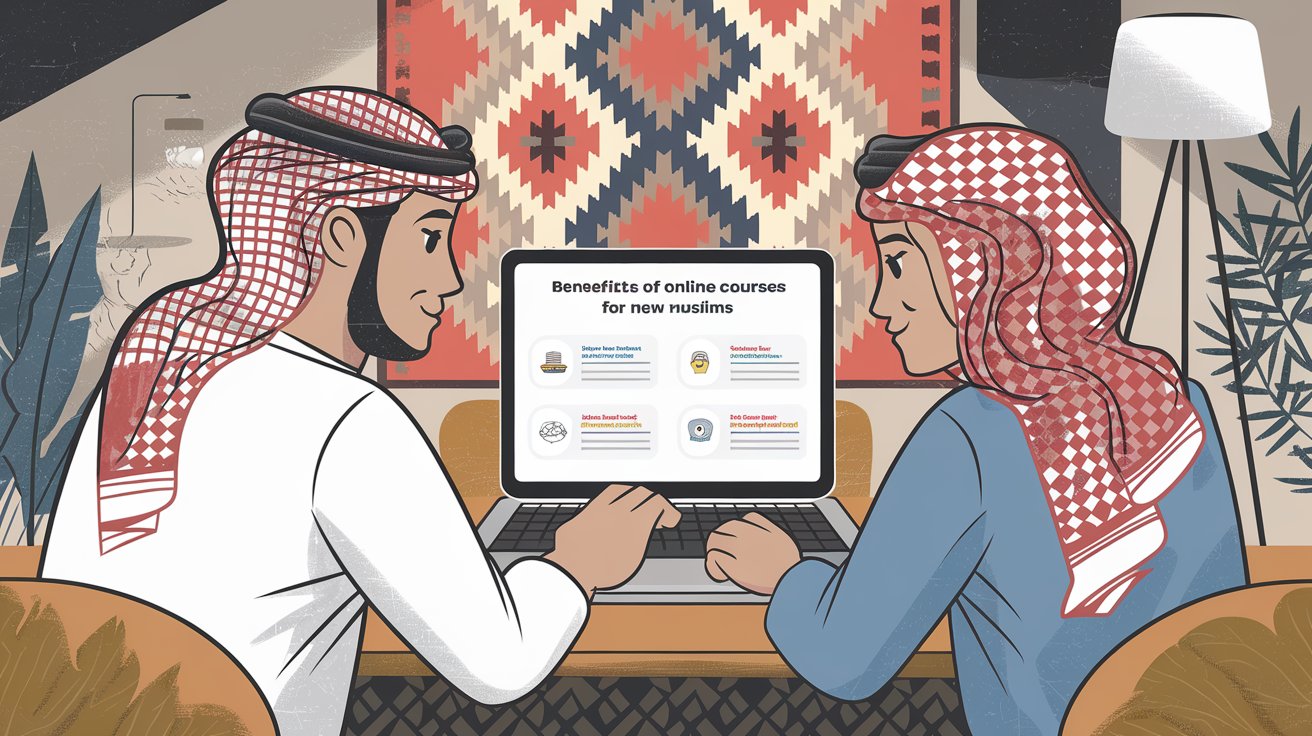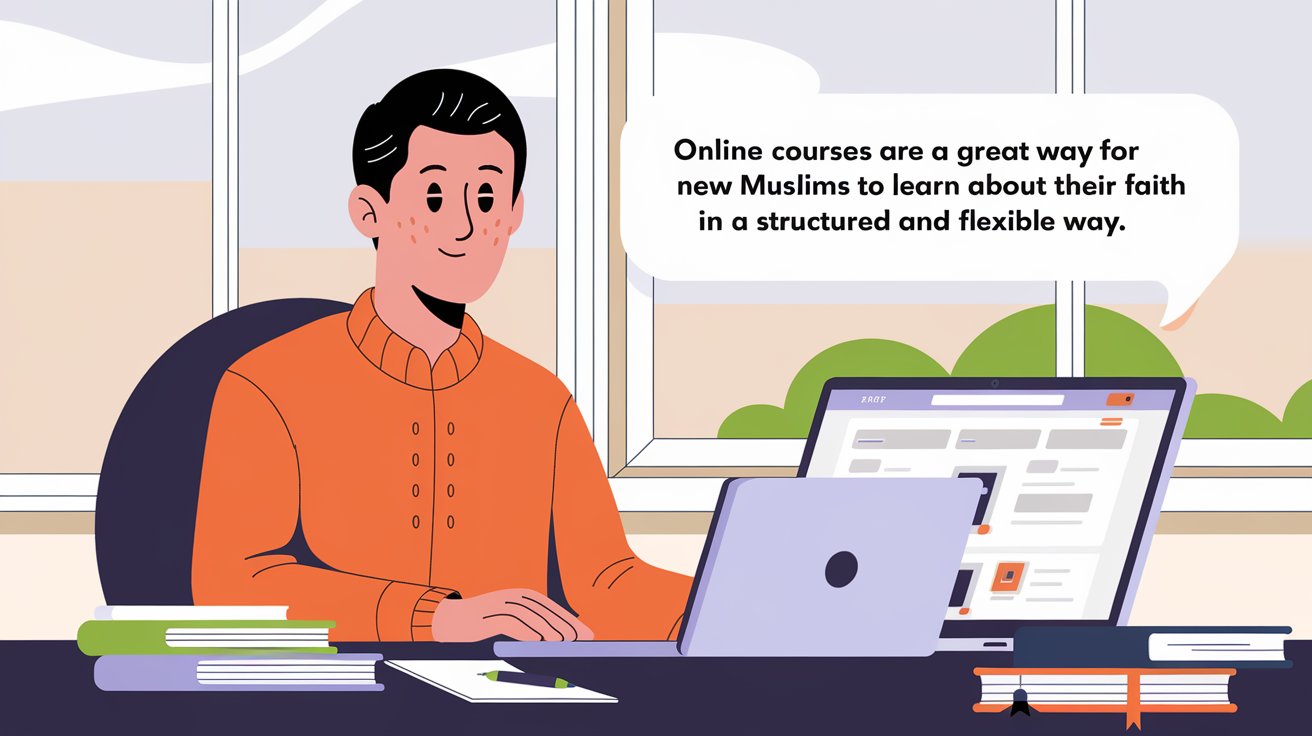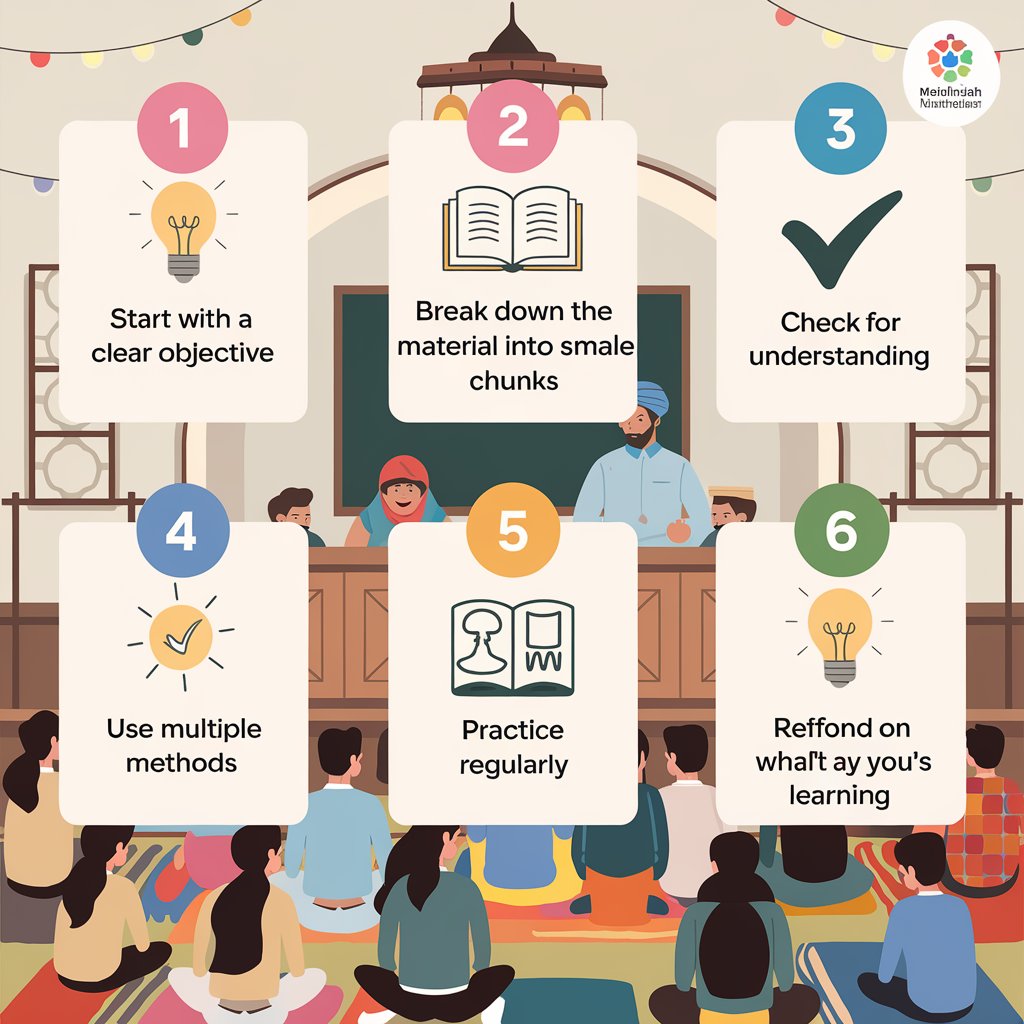Embracing Faith: Benefits of Online Courses for New Muslims
Faith is a beautiful journey, but for those new to Islam, the path can sometimes feel overwhelming. The flood of information, learning new rituals, and understanding deep concepts can be a lot to handle. But what if there was an easier way to embrace your faith, one that fits into your schedule, goes at your pace, and offers continuous support? This is where an online course for new Muslims can make all the difference.
In today’s digital age, online learning offers a world of opportunities. Whether you’re looking for a structured course on the basics of Islam or a space to ask questions in a supportive environment, an online course can be your gateway to understanding Islam more deeply, without the stress of traditional learning methods.

Table of Contents
Toggle1. Introduction
Embracing a new faith is one of the most transformative experiences anyone can go through. For many, converting to Islam is a profound and life-changing decision, filled with excitement, purpose, and, often, a sense of peace. However, learning the ins and outs of a new religion, its practices, and its beliefs can feel like diving into the deep end of a pool without knowing how to swim.
That’s where online courses come in—offering an approachable, convenient, and tailored learning experience. By taking an online course, new Muslims can learn at their own pace, surrounded by a global community of people who are on the same journey.
But what exactly are the benefits of an online course for new Muslims? Let’s dive in and explore how these courses make embracing your new faith not just manageable, but enjoyable.
2. Why Learning About Islam Matters
For new Muslims, learning about Islam is more than just understanding religious obligations—it’s about forming a deep connection with Allah and understanding the reasons behind the practices. This knowledge helps nurture faith, enables a sense of belonging, and allows one to practice Islam with confidence and sincerity.
The act of seeking knowledge in Islam is also highly encouraged. It’s not only about acquiring information but also about spiritual growth, humility, and fulfilling one’s purpose. An online course can help bridge the gap between curiosity and understanding, making it easier to live out the teachings of Islam in everyday life.
Benefits of Online Courses for New Muslims
3. Challenges New Muslims Face
Converting to a new faith, especially one as rich and complex as Islam, comes with its own set of challenges. For new Muslims, some of the hurdles include:
- Overwhelm from Information: Islamic teachings cover a wide range of topics—from daily prayers to detailed life principles. Figuring out where to start can be daunting.
- Cultural Differences: Many new Muslims may feel out of place, especially if they convert in communities where they don’t have many Muslim peers.
- Learning a New Language: Arabic plays a significant role in Islam, and understanding key terms can be tricky for beginners.
- Time Constraints: With work, family, and other obligations, finding time for classes or studies can be tough.
An online course is like a bridge, helping to address these challenges by offering structured content that’s easy to understand and fits into your schedule.
4. The Convenience of Online Learning
Gone are the days when learning had to happen in a physical classroom. Now, with just a laptop or smartphone, anyone can access valuable lessons, whether they’re sitting on their couch at home or commuting on the bus.
Online courses for new Muslims are available 24/7. This means that whether you’re a night owl or a morning person, you can fit your faith journey around your schedule. This flexibility allows new Muslims to learn without feeling pressured by time constraints.
5. Flexibility and Self-Paced Learning
One of the most significant advantages of an online course is the ability to learn at your own pace. Everyone’s journey is different—while some may absorb information quickly, others might need time to reflect and digest the material.
Online courses allow new Muslims to pause, rewind, and revisit lessons whenever they need to, ensuring that no one feels rushed or left behind. You can take a week to understand how to perform salah (prayer) correctly or spend months diving deep into Islamic history—the pace is entirely up to you.

6. A Safe Space for Questions
Imagine you’re in a classroom setting. You have a question, but you feel too shy or embarrassed to ask. This happens to many new Muslims who are afraid of being judged or of asking something that seems “basic.”
In an online course, there is no such thing as a bad question. These platforms often provide discussion forums, Q&A sessions, or even direct access to instructors, where students can ask anything, without fear of judgment. It’s a safe space for new Muslims to learn and grow without feeling intimidated.
7. Connection with a Global Community
A beautiful benefit of online courses is the opportunity to connect with a global community of Muslims. Regardless of where you are in the world, online courses bring together people from various cultures, backgrounds, and experiences, all united by their shared faith.
This sense of global connection allows new Muslims to see the diversity within Islam and feel a part of the broader ummah (Muslim community). It’s comforting to know that you’re not alone in your journey, and that support is just a click away.
8. Accessible Resources at Your Fingertips
One of the perks of online learning is access to a wealth of resources that go beyond just lessons. Most online courses offer downloadable content, ebooks, videos, and additional materials that new Muslims can refer back to at any time.
Moreover, having these resources available digitally means you can keep learning on the go. Whether you’re revisiting a lecture or looking up a specific term, everything is just a tap away.
9. Faith Development and Personal Growth
Taking an online course isn’t just about acquiring knowledge—it’s about nurturing personal and spiritual growth. For new Muslims, faith is a deeply personal journey that evolves over time. An online course can provide structured guidance, making it easier to track progress and reflect on personal growth.
By offering step-by-step modules and reflective exercises, these courses help you internalize what you’re learning, allowing you to connect your newfound knowledge with your everyday life.
10. Accountability and Structured Learning
While flexibility is key, structure is just as important when learning a new subject—especially one as expansive as Islam. Online courses provide clear pathways, often broken down into modules, quizzes, and assignments to ensure that learners stay on track.
This structured approach helps new Muslims avoid feelings of overwhelm. It also creates a sense of accountability, ensuring that students remain engaged and continue learning at a steady pace.
Benefits of Online Courses for New Muslims
11. How Online Courses Empower New Muslims
The best part about taking an online course is the empowerment it brings. With easy-to-understand lessons, relatable teachers, and a clear learning path, new Muslims can take control of their religious education.
An online course can offer tailored lessons for beginners, focusing on the foundational elements of Islam, such as the Five Pillars, the life of the Prophet Muhammad (peace be upon him), and the significance of Quranic verses in daily life. As learners grow more confident, they can advance to more detailed subjects, all while having the support of their instructors and peers.
12. Avoiding Overwhelm: Step-by-Step Guidance
Learning about a new religion can sometimes feel like drinking from a fire hose—too much information all at once. But online courses are specifically designed to break down complex ideas into manageable chunks. This step-by-step guidance ensures that learners don’t feel lost or overwhelmed.
By organizing the lessons into smaller, digestible pieces, these courses make learning about Islam an enjoyable and fulfilling process.
13. Affordability and Accessibility
One of the major advantages of online courses is their affordability. Traditional in-person courses may involve travel, accommodation, or hefty fees. In contrast, many online courses are low-cost or even free, ensuring that knowledge of Islam is accessible to everyone, regardless of financial background.
Moreover, online courses remove geographical barriers. Whether you’re in a bustling city or a remote village, as long as you have internet access, you can continue learning and growing in your faith.
14. Support Beyond the Classroom
Online courses often provide ongoing support for learners. Whether through one-on-one coaching, mentorship programs, or community discussions, the support doesn’t end when the course does. Many programs continue to offer advice and guidance, ensuring that new Muslims have the help they need, long after the course is over.
This continual support fosters a sense of belonging and ensures that no learner feels isolated on their journey of faith.
15. Conclusion: Embracing Your Journey
Embracing Islam is a beautiful and transformative experience, but it’s also a journey that requires time, patience, and guidance. An online course offers new Muslims an invaluable resource—providing flexible, accessible, and structured learning that adapts to individual needs.
Through the combination of personal growth, spiritual development, and a supportive global community, online courses make the journey of faith much easier. They allow new Muslims to grow at their own pace, ask questions without fear, and connect with fellow learners, all while gaining a deeper understanding of their faith.
FAQs – Benefits of Online Courses for New Muslims
1. What are the key benefits of online courses for new Muslims?
Online courses provide flexibility, a safe space for questions, structured learning, and access to a global community. They help new Muslims learn at their own pace without feeling overwhelmed.
2. Do online courses help with Arabic and Quranic studies?
Yes, many online courses offer modules that focus on learning basic Arabic, Quranic verses, and their meanings, making it easier for new Muslims to connect with the Quran.
3. Are online courses expensive?
Most online courses are very affordable, and some are even free, ensuring that everyone has access to Islamic education, regardless of their financial situation.
4. How do online courses support personal growth in faith?
Online courses offer structured content that helps with personal reflection and spiritual development, making it easier for new Muslims to track their progress and deepen their faith.
5. Can I learn at my own pace with an online course?
Absolutely! Online courses are designed to be self-paced, allowing you to learn when it’s convenient for you, and revisit material whenever you need.
Half Week Free Trial Classes
Upon completion of your course, you will receive a complimentary certificate. What are you waiting for, then?
Enroll in our class now for a free trial.
Read More: Navigating the New Path: Support Systems for New Muslims



